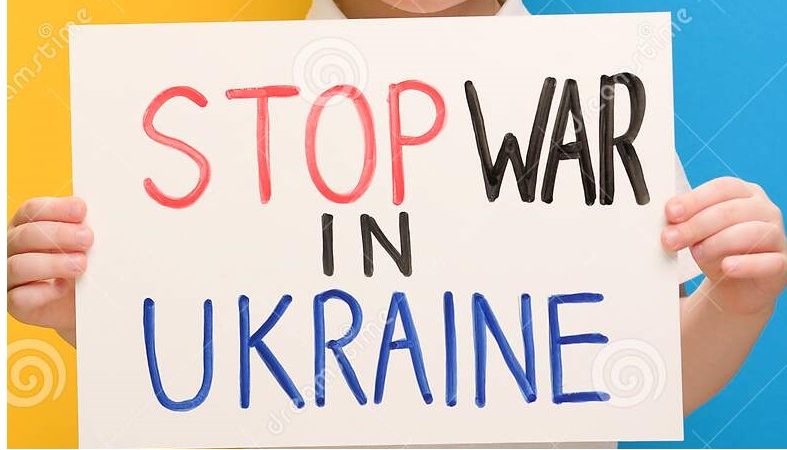
Ukraine war likely to weigh on China
James Douglas Crickton*
Already reeling from disruptions in logistics, supply chain and manufacturing operations due to multiple rounds of Covid outbreak, China is all set to face additional challenges due to Russia-Ukraine war.
If China continues to be perceived as a supporter of Russia in its aggression against Ukraine, the Western allies including the US and EU may harden their restrictions against Chinese technology companies and impose tariff and non-tariff barriers against China. US National Security Advisor, Jake Sullivan has already warned (Mar 13) Beijing of consequences for helping Moscow bypass sanctions.

Sanctions in the wake of Russian-Ukraine conflict would have implications for Beijing as well. The Biden administration’s export controls apply to goods produced in any country as long as they use US technology.
War chip makers like Taiwan Semiconductor Manufacturing Company (TSMC) and the Shanghai-based Semiconductor Manufacturing Industry Corporation (SMIC) continue to rely on the US for certain components and manufacturing technology. If these entities maintain supplies to Russia, they could be cut off from US technology.
Beijing would also face the risk of other major technology exporters, like Japan, South Korea and the Netherlands, “adopting Washington’s tougher line.”
China’s state-owned banks may also face problems for continuing to trade with Russia as they are still reliant on the US dollar. However, Beijing and Moscow have been settling most of their trade using the Yuan and the Rouble.
In the event of an escalated conflict, which would result in wider and stricter sanctions against Russia, experts believe that China may come to Russia’s economic rescue. This could include providing alternative payment systems, loans for Russian banks and firms, more purchases of Russian oil, or even outright rejection of US export controls.
However, it may not be without a cost for Chinese economy.
The European Union (EU) is China’s largest trading partner as it overtook the US in 2020. Most of this trade is in industrial and manufacturing goods, the main Chinese forte. China’s international trade is worth above USD 4 trillion and any disruption in trade due to Russia-Ukraine war would negatively impact about USD 700 billion of Chinese trade with the EU.
The Belt and Road Initiative (BRI) of China may also be negatively affected. Especially the European countries in the neighbourhood of Ukraine who are members of BRI could face difficulties in BRI related operations. These countries include Poland, Romania, Slovakia, Bulgaria, Hungary, besides Italy and the Baltic states.
An estimated 85 per cent of Chinese rail traffic to Europe transits through Belarus, which could also be adversely impacted by renewed hostilities in the region and the trade being carried out through the BRI may diminish with China losing its position as the largest trading partner of many European countries.
Domestically, the impact of the Ukraine war could slow down Xi Jinping’s policies for “Common Prosperity” as it relies on the country’s industrial growth and trade. China is already grappling with high rates of unemployment post the Covid pandemic; any further deterioration may breed discontent and social tensions.
There is a view that Beijing may exploit the ongoing Russian-Ukraine conflict to aggressively entrench itself into Mongolia’s Buddhist circle and to use the weakening Russian influence to further deter Mongolia from supporting Tibetans and the Dalai Lama.
Meanwhile, despite the increased bonhomie between Moscow and Beijing due to their isolation by the Western powers, analysts suspect that there were several irritants in their relationship.
Moscow is already uncomfortable with China’s growing presence in Central Asia, which Russia regards as its backyard; greater economic dependence of the Central Asian countries on China may only deepen that resentment. Aware of Beijing’s increasing strategic outreach through the BRI in the region, Russia has floated the Eurasian Economic Union.
It is surmised that China’s foreign policy in reality will not go beyond a limit in supporting Russia, if there are adverse effects on Chinese trade and BRI. It is also likely that the West may try to win over Beijing by some relaxations in trade and technology restrictions to wean it away from Moscow. (Poreg)
—- *The writer is a London based business consultant
-
CHINA DIGEST
-
 ChinaChina Digest
China’s PMI falls for 3rd month highlighting challenges world’s second biggest economy faces
ChinaChina Digest
China’s PMI falls for 3rd month highlighting challenges world’s second biggest economy faces
-
 ChinaChina Digest
Xi urges Chinese envoys to create ‘diplomatic iron army’
ChinaChina Digest
Xi urges Chinese envoys to create ‘diplomatic iron army’
-
 ChinaChina Digest
What China’s new defense minister tells us about Xi’s military purge
ChinaChina Digest
What China’s new defense minister tells us about Xi’s military purge
-
 ChinaChina Digest
China removes nine PLA generals from top legislature in sign of wider purge
ChinaChina Digest
China removes nine PLA generals from top legislature in sign of wider purge
-
-
SOUTH ASIAN DIGEST
-
 South Asian Digest
Kataragama Kapuwa’s arrest sparks debate of divine offerings in Sri Lanka
South Asian Digest
Kataragama Kapuwa’s arrest sparks debate of divine offerings in Sri Lanka
-
 South Asian Digest
Nepal: Prime Minister Dahal reassures chief ministers on police adjustment, civil service law
South Asian Digest
Nepal: Prime Minister Dahal reassures chief ministers on police adjustment, civil service law
-
 South Asian Digest
Akhund’s visit to Islamabad may ease tensions on TTP issue
South Asian Digest
Akhund’s visit to Islamabad may ease tensions on TTP issue
-
 South Asian Digest
Pakistan: PTI top tier jolted by rejections ahead of polls
South Asian Digest
Pakistan: PTI top tier jolted by rejections ahead of polls
-






Comments